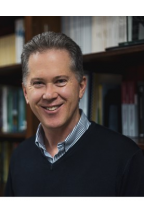Carl Haas, PEng

Biography
Carl T. Haas is a Professor in the Civil and Environmental Engineering department at the University of Waterloo. He is also a University Research Chair.
Professor Haas’s research, teaching, and consulting are in the areas of construction human-robotic systems, infrastructure computer vision, capital projects process analytics, construction productivity, and circular economy in the built environment. Professor Haas’s research has been supported by numerous companies and agencies such as NRC, OPG, CCMPA, Mitacs, AECO, Aecon, Dupont, the Construction Industry Institute (CII), NSF, and the Natural Sciences and Engineering Research Council (NSERC).
He has over 500 publications including over 215 refereed journal articles. With Ioannis Brilakis at the University of Cambridge, he co-edited Infrastructure Computer Vision. He serves on a number of editorial boards and on professional committees for organizations such as ASCE (American Society of Civil Engineers), NSERC and IAARC. He is a Fellow of the Royal Society of Canada, the Canadian Academy of Engineering, and the ASCE. He is a member of the US National Academy of Construction. He received the ASCE Peurifoy Construction Research Award In 2015. In 2017, he received the University of Waterloo Award of Excellence in Graduate Supervision. In 2019, he received the ASCE Computing in Civil Engineering Award and the Canadian Society of Civil Engineers’ Alan Russell Award. He recently revised Project Management for Construction (and Deconstruction) – Fundamental Concepts for Owners, Engineers, Architects and Builders by Hendrickson, Haas, Au - 2024, ISBN 978-1-7383557-0-9.
Research Interests
Digital twins
Augmented and virtual reality
Construction
Sensing
Infrastructure
Automated 3-D Reconstruction
Augmenting the Capabilities of EPPM Systems
Construction Productivity Analysis
Additive manufacturing
Advanced robotics
Digital design and fabrication technologies
Environmental issues and new material economies
Globalization
Human movement
Human factors (Ergonomics)
Image processing and data analytics
Wearable technology
Smart buildings
Information systems
Drinking water
Waste water management
Operational Artificial Intelligence
Smart Infrastructure
Scholarly Research
Carl Haas is a University Research Chair in Construction and Management of Sustainable Infrastructure at the University of Waterloo. His research, teaching and consulting are in the areas of construction, AI, robotics, and circularity in the built environment. He teaches courses in Circular Engineering in the Built Environment, Construction Engineering, Modeling and Simulation, Engineering Economics, and Construction Automation. He has received many research and teaching awards. He has well over 500 publications including 215 refereed journal articles.
Industrial Research
My activity falls into three research thrusts as follows:
- advancing construction project management and productivity
- enabling circularity in the built environment
- improving asset management
Education
1990, Doctorate Civil Engineering, Carnegie Mellon University, United States
1986, Master's Civil Engineering, Carnegie Mellon University, United States
1985, Bachelor's Systems Design Engineering, University of Waterloo, Canada
Awards
He received the ASCE Peurifoy Construction Research Award In 2015.
In 2017, he received the University of Waterloo Award of Excellence in Graduate Supervision.
In 2019, he received the ASCE Computing in Civil Engineering Award and the Canadian Society of Civil Engineers’ Alan Russell Award.
Service
Chair of the Department of Civil and Environmental Engineering (2017-2022 with interludes)
Professional Associations
CSCE
ASCE
NAE
RSC
CAE
Teaching*
- CIVE 596 - Construction Engineering
- Taught in 2024, 2025
- CIVE 700 - Topics in Structural Engineering
- Taught in 2021, 2022, 2024, 2025
* Only courses taught in the past 5 years are displayed.
In The News
Graduate studies
I am currently seeking to accept graduate students. Please submit your graduate studies application and include my name as a potential advisor.